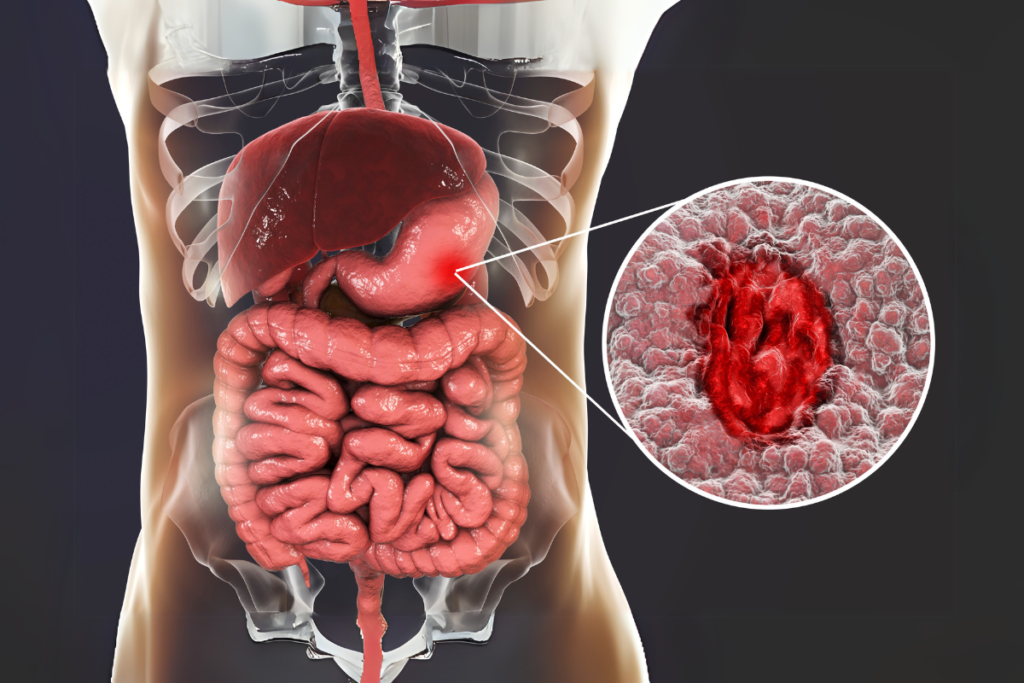Open sores that form on the lining of the stomach, small intestine, or oesophagus are known as peptic ulcers. Peptic ulcers, which are much more common than most people realize, are caused by an imbalance between the stomach’s defenses and digesting acids. By being aware of the symptoms, risk factors, and available treatments, one can avoid complications and encourage healing.
What is a Peptic Ulcer?
A peptic ulcer is a lesion that forms when stomach acid damages the stomach lining or duodenum (the first part of the small intestine). Though prolonged use of nonsteroidal anti-inflammatory medicines (NSAIDs) and excessive alcohol intake can also play a role, Helicobacter pylori infections are the most common cause of peptic ulcers.
Symptoms of Peptic Ulcers:
● Burning Stomach Pain: A common symptom of peptic ulcers, usually felt between meals or at night.
● Bloating: A feeling of fullness or pressure in the stomach.
● Nausea and Vomiting: Severe nausea, perhaps accompanied by vomiting blood.
● Dark Stools: Stools containing blood may be sticky and dark.
Causes and Risk Factors:
1. H. pylori Infection:
A bacterial infection that weakens the stomach’s protective mucous lining, making it more susceptible to damage by stomach acid.
2. NSAIDs and Aspirin:
Using aspirin and ibuprofen frequently might irritate the stomach lining and increase the risk of ulcers.
3. Excessive Alcohol and Smoking:
Smoking and drinking both increase stomach acid production, which increases the risk of ulcer development.
4. Stress:
Although not a direct cause, high levels of stress can exacerbate ulcer symptoms and slow healing.
Treatment Options:
1. Medications:
● Proton Pump Inhibitors (PPIs): These lower stomach acid production to promote ulcer healing, e.g., Omeprazole.
● Antibiotics: If H. pylori is present, a combination of antibiotics will be used to stop the infection.
● Antacids and H2-Receptor Antagonists: These medications help neutralise stomach acid and reduce irritation.
2. Lifestyle Changes:
● Dietary Modifications: Avoid spicy foods, caffeine, alcohol, and acidic foods that can irritate the ulcer.
● Quit Smoking and Limit Alcohol: Alcohol consumption and smoking intensify ulcer symptoms and slow their healing.
3. Surgery:
● In severe cases, when complications such as bleeding, perforation, or obstruction occur, surgery may be required to remove the ulcer or part of the affected area of the stomach.
FAQs
Can peptic ulcers be cured?
Yes, with proper treatment, most peptic ulcers heal within a few weeks. Treatment usually involves a combination of antibiotics, PPIs, and lifestyle changes.
Can stress cause peptic ulcers?
While stress doesn’t directly cause ulcers, it can worsen symptoms and delay healing.
Disclaimer:
This information is for educational purposes and should not replace professional medical advice. Always consult a healthcare provider for personalised recommendations.
How HealthPil Can Help:
HealthPil connects you with gastroenterologists who can diagnose and treat peptic ulcers. Schedule your consultation today for personalised care and treatment options!

